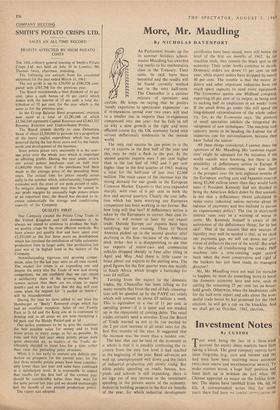More, Mr. Maudling
By NICHOLAS DAVENPORT . The only real success he can point to is the rise in exports in the first half of the year and this„ may be only a. flash in the pan. In the second quarter exports were 5 per cent higher than in the last half of 1962 and 3 per cent higher than in the first quarter of 1963, making a total for the half-year of just over £2,000 million. The main cause of the increase was the strong demand for our goods in the European Common Market. Exports to that area expanded .sharply, with rises of 6 per cent in both the , first and second quarters. Clearly the cost infla- tion which has been worrying our European competitors has been working in our favour. But how long will that last? If deflationary action is taken by the Europeans to correct their cost in- flation it will sooner or later hit our export 'trade. Outside Europe our exports have been satisfying, but not exciting. Those to North America picked up in the second quarter after declining in the first—because of the American dock strike—but it is disappointing to see that our exports of motor-cars and commercial vehicles dropped sharply in June after rising in April and May. And there is little cause to boast about our exports to the sterling area. The good figures for the first quarter were due mainly to South Africa, which bought a battleship for over £4 million.
Turning from the export to the domestic trades, the Chancellor has been telliog us for many months that from the end of July consump- tion will be speeded up by the PAYE tax reliefs which will amount to about £5 million a week. This is equivalent to a rise of if per cent in spending power—if it is spent and not washed up in the repayment of coming debts. The retail trades certainly need a stimulus. Even the Board of Trade warned us not to be too excited by the 2 per cent increase in all retail sales for the first five months of the year. It suggested that the increase was 'no more than a modest one.'
The best that can be said of the economy as a whole is that it is steadily continuing the re- covery from the very low level it had reached at the beginning of the year. Bank advances are well up, unemployment well down and the index of industrial production still slowly rising. But while public spending on roads, houses, hos- pitals and schools is still expanding, theee is no sign yet of any increase in the investment spending in the private sector of the economy. Industrial building projects in the first six months of the year, for which industrial development
certificates have been issued, were still below the level of the first six months of 1962. As for machine tools, they remain the black spot in the economy. Their order books continue to shrink. Domestic orders are down 11 per cent on last year, while export orders have dropped by nearly 40 per cent. The trouble is that the motor in- dustry and other important industries have too much spare capacity to need more equipment. The Economist quotes one Midland company. exporting 60 per cent of its output, as being near to sacking half its employees in six weeks' time, If the small firms go under this will speed the long-delayed rationalisation of the whole indus- try, for, as the Economist says, 'the plethora of small specialists inhibits the • integrated de- velopment of new techniques.' The machine tool industry seems to be heading the Labour list of industries ripe for nationalisation, because they have 'failed the nation.'
All these things considered. I cannot share the optimism of Mr. Maudling. His 'cautious expan- sion' might be adequate for the occasion if the world outside were booming, but there is the possibility of deflationary action in Europe if the cost inflation continues, and now there is the prospect over the next eighteen months of the European, sterling area and Japanese reserves being $3,000 million lower than they would have been if President Kennedy had not decided to bring the American deficit down by that amount.. Is not that a deflationary threat calculated to make every industrial nation nervous about its balance of payments and less inclined to pursue: an expansionary policy? The rise in short-term. interest rates may be a warning of worse to come. Mr. Kennedy himself is aware of the seriousness of the deflationary threat, for he 'has said: 'One of the reasons that new sources of liquidity may well be needed is that, as we close our payments gap, we will cut down our pro- vision of dollars to the rest of the world.' But what is the chance of transforming the creaky IMF machine into a note-creating super central bank when the most conservative and rigid of the bankers has just been made its managing director?
No, Mr. Maudling must not wait for miracles to happen; he must do something more to boost the domestic economy here and now, such as cutting the remaining 25 per cent tax on house- hold goods. Otherwise, when the headmaster calls for the half-term report and asks about the won- derful trade boom he has promised for the 1964 election, he will get a rap on the knuckles. And we shall get an October, 1963, election.






























 Previous page
Previous page